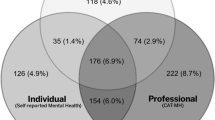Abstract
The purpose of this study was to determine HMO physicians' receptivity to special organized programs dealing with sociomedical and behavioral problems. The study population consisted of full-time physicians in a large prepaid group practice HMO, and the data were obtained in 1977 by means of a self-administered structured questionnaire. Most physicians favored special organized services for alcoholism, drug abuse, obesity, disturbances in sexual relations, and the like. Except for alcohol and drug abuse, favoring organized services for one problem did not correlate highly across problem areas. Specialty, AMA membership, and political orientation were the main characteristics that differentiated physicians on their receptivity to organized programs for sociomedical problems. Social background and professional training and experience may be more important than the practice setting in influencing physicians' receptivity to these types of services.
Similar content being viewed by others
References
Engel GL: The need for a new medical model: A challenge for biomedicine.Science 196 129–136, 1977.
Petersdorf R, Feinstein A: An informal appraisal of the current status of “Medical Sociology”.JAMA 245 943–950, 1981.
Dorsey JL: The Health Maintenance Organization Act of 1973 (P.L. 93-222) and prepaid group practice plans.Med Care 13 1–9, 1975.
Triger S, Galblum T, Riley G: HMOs: Issues and Alternatives for Medicare and Medicaid. HHS Publication (HCFA) 03107, 1981.
Mechanic D:Medical Sociology. Ed 2. New York, Free Press, 1978, 397–400.
Strauss A:Boys in White: Student Culture in Medical School. Chicago, University of Chicago Press, 1961.
Mumford E:Interns—From Students to Physicians. Boston, Harvard University Press, 1970.
Coe R:Sociology of Medicine. New York, McGraw Hill, 1978, 197–229.
Mechanic D:Politics, Medicine and Social Science. New York, Wiley-Interscience, 1974, 69–87.
Goldman L: Factors related to physician's medical and political attitudes: A documentation of intraprofessional variations.J Health Soc Behav 15 177–187, 1974.
Colombotos J: Social origins and ideology of physicians: A study of the effect of early socialization.J Health Soc Behav 10 16–29,, 1969.
Freidson, E, Mann J: Organizational dimensions of large scale group medical practice.Am J Public Health 61 786–795, 1971.
Ima K, Tagliacozzo DM, Lashof JC: Physician orientation and behavior—A study of outpatient clinic physicians.Med Care 8 189–199, 1970.
McElrath D: Perspective and participation of physicians in group practice.Am Sociol Rev 26 596–607, 1961.
Coleman JS, Katz E, Menzel H:Medical Innovation: A Diffusion Study. New York, Bobbs Merrill, 1966.
Coe R, Brehm H:Preventive Health Care for Adults. New Haven, College and University Press, 1972, 71–87.
Saward E, Blank J, Lamb H:Some Information Descriptive of a Successfully Operating HMO. DHEW Publication (HSM) 73-13011, 1973.
Phillips BS:Social Research. New York, MacMillan, 1966, 187–195.
Kerlinger FN, Pedhazur EJ:Multiple Regression in Behavioral Research. New York, Holt, Rinehart and Winston, 1973, 336–349.
Additional information
At the time of this study, Dr. Nash was a medical student at the University of Rochester School of Medicine and Dentistry. Dr. Freeborn is Associate Director of the Health Services Research Center, Kaiser-Permanente Medical Care Program, Oregon Region, 4610 S.E. Belmont, Portland, Oregon 97215. Dr. Barker is Associate Professor, Department of Preventive, Family and Rehabilitation Medicine, University of Rochester School of Medicine and Dentistry. Requests for reprints should be addressed to Dr. Freeborn.
The authors would like to acknowledge the contributions of B.J. Darsky, Ph.D., who with Dr. Freeborn is responsible for the physician survey from which the physicians' data derive. Dr. John Mullooly's statistical consultation on the analysis is also appreciated. Finally, thanks are due Vicky Burnham and others at the Research Center who helped on various aspects of the study.
Rights and permissions
About this article
Cite this article
Nash, D.B., Freeborn, D.K. & Barker, W.H. A study of HMO physicians' receptivity to special programs for sociomedical and behavioral problems. J Community Health 7, 239–249 (1982). https://doi.org/10.1007/BF01318957
Issue Date:
DOI: https://doi.org/10.1007/BF01318957




